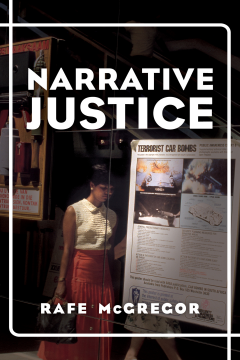
Additional Information
Book Details
Abstract
This book introduces narrative justice, a new theory of aesthetic education – the thesis that the cultivation of aesthetic or artistic sensibility can both improve moral character and achieve political justice. The author argues that there is a subcategory of narrative representations that provide moral knowledge regardless of their categorisation as fiction or non-fiction, and which therefore can be employed as a means of moral improvement. McGregor applies this narrative ethics to the criminology of inhumanity, including both crimes against humanity and terrorism. Expanding on the methodology of narrative criminology, he demonstrates that narrative representations can be employed to evaluate responsibility for inhumanity, to understand the psychology of inhumanity, and to undermine inhumanity – and are thus a means to the end of opposing injustice. He concludes that the cultivation of narrative sensibility is an important tool for both moral improvement and political justice.
In Narrative Justice, McGregor applies meticulous philosophical reasoning to work out how we might reduce criminal inhumanity through narrative. His ideas on the ethical value of narrative representation and the knowledge-generating capacity of ‘exemplary stories’ will be of enduring value to social theory, criminology, and to anyone who hopes to change minds.
Lois Presser, Professor of Sociology, University of Tennessee
Can stories reduce crime? Rafe McGregor believes so, specifically when it comes to ideologically motivated crime, whether perpetrated by state actors or non-state actors. Narrative Justice is a major contribution to narrative criminology with criminological applications and ethical implications that make imperative reading for those tasked with law enforcement and policy making at the highest levels.
Ajit Maan, Founder and CEO, Narrative Strategies LLC
In Narrative Justice Rafe McGregor offers a strikingly original defense of the idea that works of narrative art have a distinctive capacity to cultivate understanding and promote an ethical society. A fascinating feature of this books is its turn to criminology as a fresh site for thinking about art’s ability to develop moral sensibilities and character. Narrative Justice is ultimately a plea for the importance of aesthetic education, an idea championed by Friedrich Schiller in 1794 and here modernized and made responsive to contemporary concerns and problems. This book is a must-read for anyone interested in why healthy societies need good narratives.
John Gibson, Professor of Philosophy, University of Louisville
Rafe McGregor is Senior Lecturer in Criminology at Edge Hill University. He specialises in narrative representation, ideologically-motivated crime, and social exclusion. He is the author of The Value of Literature, two novels, and over 250 journal articles, review essays, and short stories. He can be found online at @rafemcgregor.
Table of Contents
| Section Title | Page | Action | Price |
|---|---|---|---|
| Cover | Cover | ||
| Half Title | i | ||
| Title Page | iii | ||
| Copyright Page | iv | ||
| Contents | v | ||
| Acknowledgments | xiii | ||
| Preface | vii | ||
| 1 Narrative Representation | 1 | ||
| 1. Narrative Representation and Non-Narrative Representation | 1 | ||
| 2. Values of Narrative | 5 | ||
| 3. Aesthetic Education | 9 | ||
| 4. Criminal Inhumanity | 14 | ||
| 5. Narrative Criminology | 20 | ||
| 2 Contemporary Aesthetic Education | 29 | ||
| 6. Reading, Detranscendentalisation, and Epistemological Performance | 29 | ||
| 7. Literary Imagination, Ethics, and Impossibility | 33 | ||
| 8. Narrative Understanding | 38 | ||
| 9. Empirical Evidence | 43 | ||
| 3 Narrative Ethics | 53 | ||
| 10. Ethical Value and Narrativity | 53 | ||
| 11. Ethicism | 58 | ||
| 12. Closural Moral Order | 65 | ||
| 4 Narrative Knowledge | 73 | ||
| 13. Knowledge and Narrativity | 73 | ||
| 14. Epistemic Criterion | 77 | ||
| 15. Narrativity Criterion | 84 | ||
| 5 Narrative Justice | 89 | ||
| 16. Ethical Knowledge and Narrativity | 89 | ||
| 17. Fascist Fictions | 93 | ||
| 18. Poetic Justice? | 99 | ||
| 19. Narrative Justice | 102 | ||
| 6 Narrative Value | 109 | ||
| 20. Hyperbolic Ethics and Deconstructive Politics | 110 | ||
| 21. Literature, Empathy, and Experimentation | 113 | ||
| 22. Conclusion, Coherence, and Correspondence | 117 | ||
| 23. Correlation, Causation, and the Law | 120 | ||
| 24. Gregory Currie and Martha Nussbaum | 124 | ||
| 7 Responsibility for Inhumanity | 131 | ||
| 25. Two Wars | 131 | ||
| 26. Three Charges | 133 | ||
| 27. Defending de Man | 135 | ||
| 28. Commending Campbell | 138 | ||
| 29. Silence and Deceit | 141 | ||
| 30. Silence and Remorselessness | 144 | ||
| 8 The Psychology of Inhumanity | 151 | ||
| 31. In the Heart of the Country | 151 | ||
| 32. The Person of the Torturer | 154 | ||
| 33. In the Heart of the Whore | 158 | ||
| 34. The Problem That Troubles the Novelist | 163 | ||
| 9 Undermining Inhumanity | 169 | ||
| 35. Narrative Strategies | 169 | ||
| 36. White Genocide | 174 | ||
| 37. Crusader | 178 | ||
| 38. Reducing Violent Extremism | 183 | ||
| 39. Coda: Methodology? | 188 | ||
| Bibliography | 197 | ||
| Index | 211 | ||
| About the Author | 217 |
